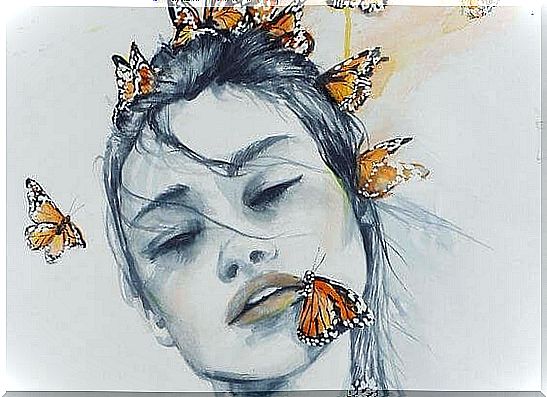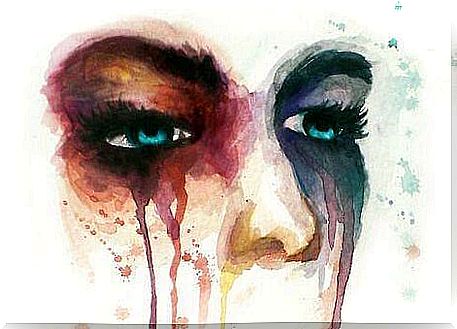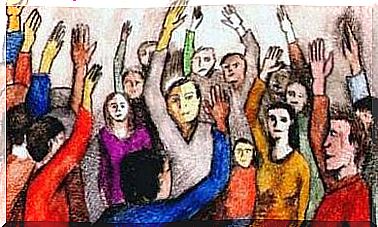The 6 Types Of Mourning

Mourning is one of the conditions that all human beings have to face several times in their life.
We are not born yet as we are already starting to lose people. And with every loss comes suffering that must be heard and overcome.
What all grief has in common is that it involves loss. However, and since losses can be of various kinds, there are also different types of grief.
We speak of “progressive bereavement” when we refer to losses that involve the passage from one age to another.
We also speak of “social bereavement”, such as the loss of a job, retirement, exile ect.
The bereavements which bring the most difficulties are all the same those which generate the loss of loved ones, mainly because of death.
This is due in large measure to the fact that the bond is broken, but not the love that made it up, nor the dreams, fantasies and hopes that came with it.
This is why the suffering is intense and requires a lot of work to be overcome. From an emotional loss perspective, there are several types of grief that we will describe to you here.
Anticipated grief
This mourning takes place when we realize that we are going to suffer an imminent loss, but that it has not yet materialized.
It occurs when, for example, a divorce is being prepared, a long trip, when an illness presents itself, or even a euthanasia is scheduled.

The difference with other grief is that in anticipated grief , feelings tend to be much more ambivalent and unstable.
As the person is always there, the sufferers alternate between proximity and distance: they want to feel the presence of this person one last time, but they are afraid of the attachment that this generates at the same time.
In these cases, it is best to express these feelings openly and directly to the person who is going to leave.
Absent mourning
It is a form of mourning in which the affected person blocks their feelings.
He pretends to act as if nothing has happened and becomes completely hermetic about the subject. In fact, if he mentions it, he gives it a lower value than he would give to any other subject.
In this case, what works is a denial mechanism. The impact is so strong that the person does not feel able to face it.
The problem is, occult pain always comes back, whether in the form of irritability, anxiety, or physical illness, among others.
Chronic grief
Chronic grief occurs when a person cannot cope with the loss of a loved one.
Somehow, she resists the idea of accepting what happened and focuses on keeping the memory of this person alive who is no more.
She ends up being paralyzed in her life and systematically confining herself to a position of pain.

People with depressive tendencies are more likely to settle into this type of bereavement, which becomes a way of life.
Anxiety, sadness and guilt take precedence over the rest, as well as a feeling of helplessness and disillusionment. This type of bereavement requires professional help.
Delayed mourning
This is, in general, an effect of absent mourning. Even though at first the person does everything to ignore their pain, it emerges very powerfully after a while, and perhaps at the least expected time.
It can sometimes take several years to reappear and mark the real beginning of mourning.
It also takes place when a person cannot grieve at the time the loss occurs, due to special conditions, such as too demanding a professional commitment, or an urgent family situation.
The pain in question appears later and has some complications as it usually has to be experienced alone.
Grieving inhibited
This type of grief is experienced by people who have great difficulty expressing their feelings.
This is the case with children, who cannot express through words everything the situation represents.
In many cases, adults ignore their pain and do not help them get over it because they believe they do not understand.

Grief is also inhibited in cases of cognitive impairment or in situations where one is a father or mother and where one tries to stay strong so as not to affect the children.
In all cases, inhibition translates into obsessions, constant depression, anxiety etc.
Unauthorized bereavement
In unauthorized bereavement, what happens is a rejection by those around him of the pain that the person is feeling.
The others are constantly trying to prevent mourning because according to them, the one who lives this suffering must forget it and resume his life as before, without thinking about it.
But there are also specific situations where mourning is prevented from the start.
For example, when a man or woman who had an extramarital affair dies. The lover or the mistress “do not have the right” to express their weight.
This also applies to the death of a pet, because if it causes great pain, there will always be people who will minimize that suffering.









